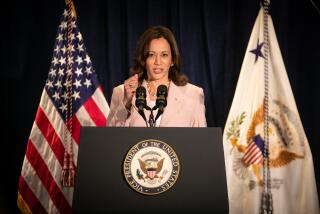Cash Wagon Stops at GOP’s Door Now : Campaign contributions in Republican-dominated House set a staggering record
- Share via
In the first half of 1993, incumbents in the Democrat-dominated House of Representatives raised $31.5 million in campaign contributions, the highest total reported in the 20 years that records had been kept. If money in such huge amounts has become the lifeblood of modern politics, as apologists for uninhibited fund raising maintain, it has also become ineradicably identified in the public mind with the distortion and corruption of the political process. Campaign finance reform remains high on the public’s agenda of needed change. How has this concern and the shifting of the House to Republican control last January affected the flow of mainly special-interest money to congressional incumbents?
The answer is something of a bitter joke. In the first six months of this year House members shattered the fund-raising record set just two years ago. From donors seeking the access and favors that big contributions virtually guarantee they collected $43.8 million--a staggering 38% increase.
Republicans are happily rediscovering what Democrats have known for decades: The big money tends to go to the majority party, because that’s where the legislative action comes from. Of the top 50 money raisers in the House this year, 36 are Republicans; only 15 made the list when Democrats ran the show.
Surprisingly, 10 of this year’s biggest cash collectors are GOP freshmen, among them Reps. John Ensign of Nevada, who is on the tax-writing Ways and Means Committee, and Daniel Frisa of New York, a member of the Commerce Committee.
Overall, Republican first-termers have raised an average of $142,000 so far in 1995, while Democratic freshmen have averaged about $78,000. Nevertheless, once again leading the top 50 is a Democrat, Minority Leader Richard A. Gephardt of Missouri, with $1.2 million. House Speaker Newt Gingrich collected a far-from-paltry $885,000.
Republicans, who for years complained, with some justice, that the flow of campaign money tipped the electoral scales toward Democratic House incumbents, seem well on their way to benefiting from that tilt next year.
Incumbency does not, of course, assure reelection, as scores of Democrats discovered last November. But it usually does make it possible to outspend one’s challengers. From time to time, under public prodding, Congress makes noises about campaign finance reform. What the first half of 1995 has produced is indisputable evidence--once again--of just how empty those noises have been.
More to Read
Get the L.A. Times Politics newsletter
Deeply reported insights into legislation, politics and policy from Sacramento, Washington and beyond. In your inbox twice per week.
You may occasionally receive promotional content from the Los Angeles Times.










